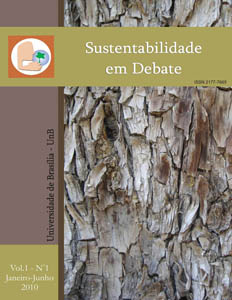Responsabilização Pós-Consumo e Logística Reversa:
O Caso das Embalagens de Agrotóxicos no Brasil
DOI :
https://doi.org/10.18472/SustDeb.v1n1.2010.727Mots-clés :
Pós-consumo, Logística Reversa, Embalagens de agrotóxicos, SustentabilidadeRésumé
As embalagens vazias de agrotóxicos apresentam risco de contaminação humana e ambiental. Este trabalho apresenta uma análise, sob a ótica da sustentabilidade, do sistema de recolhimento e destinação final das embalagens de agrotóxicos no Brasil, criado a partir da Lei 9.974/2000, que estabeleceu responsabilidades pela embalagem pós-consumida. Em 2002, foi criado o Instituto Nacional de Processamento de Embalagens Vazias (Inpev) que utiliza o princípio da Logística Reversa, objetivando retorno das embalagens ao ciclo de negócios por meio da reciclagem. Verificou se que o sistema vem contribuindo para a redução de impactos ambientais e necessita de alterações visando a sustentabilidade.
Téléchargements
Références
Associação Brasileira de Normas Técnicas (ABNT).NBR 10.004: Resíduos Sólidos. Classificação. Rio deJaneiro: ABNT, 2004.
Associação Brasileira de Normas Técnicas (ABNT).NBR 13.968: Embalagem rígida vazia de agrotóxico.Procedimentos de lavagem. Rio de Janeiro: ABNT,1997.
Associação Brasileira de Normas Técnicas (ABNT).NBR 14.719: Embalagem rígida vazia de agrotóxico. Destinação final da embalagem lavada - Procedimento. Rio de Janeiro: ABNT, 2001.
Associação Brasileira de Normas Técnicas (ABNT).NBR 14935: Embalagem vazia de agrotóxico. Destinação final de embalagem não lavada ”“ Procedi-mento. Rio de Janeiro: ABNT, 2003.
Associação Brasileira de Normas Técnicas (ABNT).NBR 10.004: Resíduos Sólidos. Classificação. Rio deJaneiro: ABNT, 2004.Associação Brasileira de Normas Técnicas (ABNT).NBR 13.968: Embalagem rígida vazia de agrotóxico. Procedimentos de lavagem. Rio de Janeiro: ABNT, 1997.
BALASSIANO, Daniela Starke. Aspectos da responsabilidade civil ambiental pós-consumo no descarte de resíduos sólidos urbanos. Relatório PIBIC. Pontifícia Universidade Católica do Rio de Janeiro.Disponível em: http://www.puc-rio.br/pibic/. Acesso em: 03 jul. 2009.
BRASIL Lei n. 7.802, de 11 de julho de 1989. DiárioOficial da União, Brasília, 12 jul. 1989.BRASIL. Decreto n. 4.074, de 04 de janeiro de 2002.Diário Oficial da União, Brasília, 08 jan. 2002.
BRASIL. Lei n. 9.974, de 06 de junho de 2000. Diá-rio Oficial da União, Brasília, 07 de jun. 2000.
CEMPRE. Comissão Empresarial para Reciclagem.Lixo municipal: Manual de Gerenciamento Integra-do. 2. Edição. São Paulo: IPT, 2000.
DIAS, Jefferson Aparecido; MORAES FILHO,Ataliba Monteiro de. Os resíduos sólidos e a responsabilidade ambiental pós-consumo. Disponível em: <www.prsp.mpf.gov.br/marilia>. Acesso em: 25 jun. 2009.
Instituto Nacional de Processamento de Embalagens Vazias (Inpev). Relatório Anual 2008. Disponível em:<http://www.inpev.org.br>. Acesso em: 25 ago. 2009.
KUMAR, A; TAN, A. Reverse Logistics Operationsin the Asia-Pacific Region Conducted by Singapore Based Companies: an Empirical Study. Conradi Research Review, v. 2, issue 1, 2003, p. 27 - 49.
LACERDA, L. Logística reversa. Uma visão sobre os conceitos básicos e as práticas operacionais. Disponível em: <http://www.cel.coppead.ufrj.br/fs-busca.htm?fr-public.htm>. Acesso em: 20 jan. 2008.
LEITE, Paulo Roberto. Logística Reversa: meioambiente e competitividade. 1. ed. São Paulo: Pearson Prentice Hall, 2003.
MACHADO, Paulo Affonso Leme. Direito ambiental brasileiro. 12. ed. rev., atual. e amp. São Paulo: Malheiros, 2004.
SACHS, I. Caminhos para o Desenvolvimento Sus-tentável. Rio de Janeiro: Garamond, 2002.
SCHOENEBERG, A.V. Waste Management and Recycling in Germany. Lessons on How to Organise Recycling and MSW Systems. Athens: Papazisis, 1994.
Téléchargements
Publié-e
Comment citer
Numéro
Rubrique
Licence
(c) Tous droits réservés Sustentabilidade em Debate 2010

Cette œuvre est sous licence Creative Commons Attribution - Pas d'Utilisation Commerciale - Pas de Modification 4.0 International.
SUSTAINABILITY IN DEBATE – Copyright Statement
The submission of original scientific work(s) by the authors, as the copyright holders of the text(s) sent to the journal, under the terms of Law 9.610/98, implies in the concession of copyrights of printed and/or digital publication to the Sustainability in Debate Journal of the article(s) approved for publication purposes, in a single issue of the journal. Furthermore, approved scientific work(s) will be released without any charge, or any kind of copyright reimbursement, through the journal’s website, for reading, printing and/or downloading of the text file, from the date of acceptance for publication purposes. Therefore, the authors, when submitting the article (s) to the journal, and gratuitous assignment of copyrights related to the submitted scientific work, are fully aware that they will not be remunerated for the publication of the article(s) in the journal.
The Sustainability in Debate Journal is licensed under Creative Commons License – Non-Commercial-No-Derivation Attribution (Derivative Work Ban) 3.0 Brazil, aiming at dissemination of scientific knowledge, as indicated on the journal's website, which allows the text to be shared, and be recognized in regards to its authorship and original publication in this journal.
Authors are allowed to sign additional contracts separately, for non-exclusive distribution of the works published in the Sustainability in Debate Journal (for example, in a book chapter), provided that it is expressed the texts were originally published in this journal. Authors are allowed and encouraged to publish and distribute their text online, following publication in Sustainability in Debate (e.g. in institutional repositories or their personal pages). The authors expressly agree to the terms of this Copyright Statement, which will be applied following the submission and publishing by this journal.






